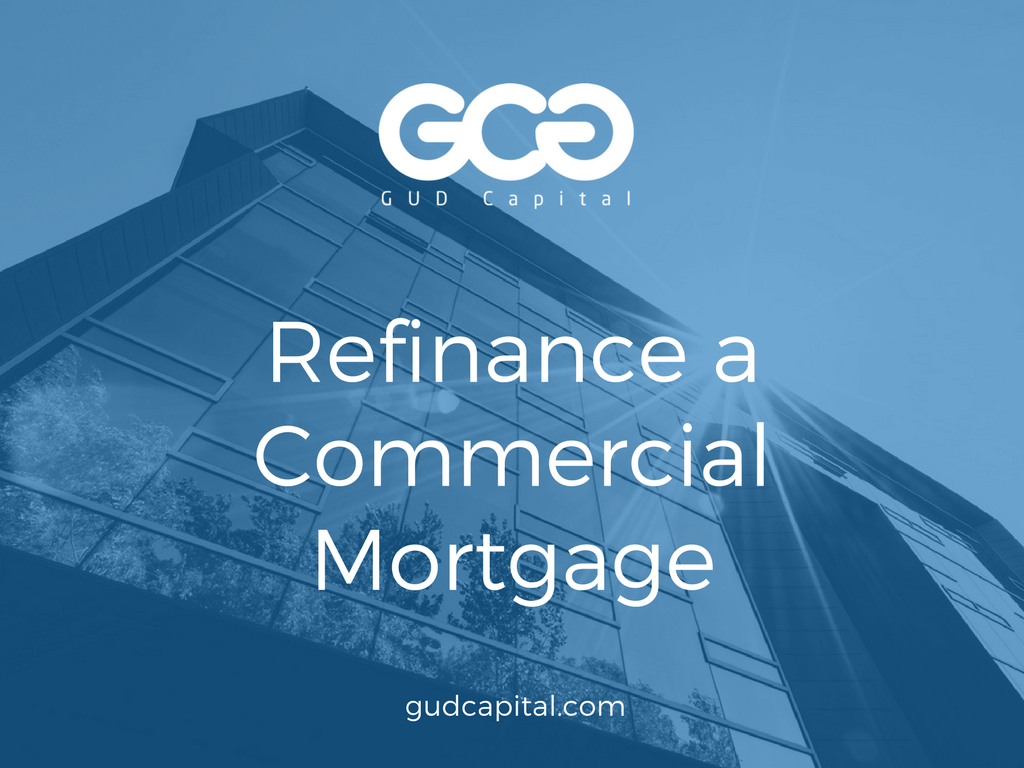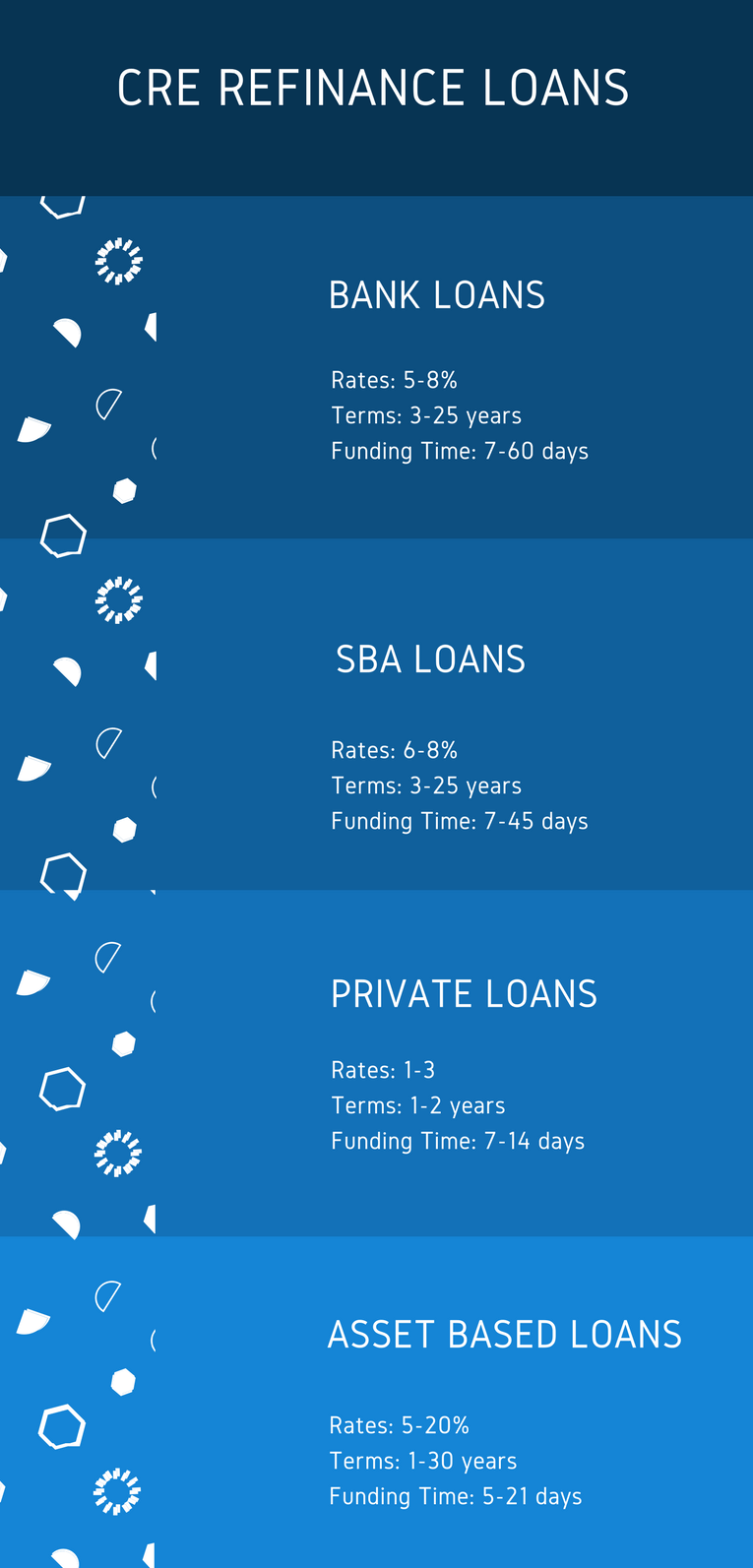Refinance a Business Mortgage
There are a variety of reasons a business or commercial real estate owner may look to refinance their property. Some may be looking to refinance their real estate to help reduce a debt strain that their current mortgage may be causing their business and operations. Others may be looking to extend a term of their mortgage – particularly commercial real estate owners that currently have a bridge loan or hard money loan that will soon be up for renewal or payoff. And then there are others that have commercial real estate with substantial value (more than their current mortgage balance) that is simply looking to tap into the real estate’s equity to use for other business purposes (general operating capital, build-outs, tenant improvements). In this article, we will explore some of the commercial mortgage refinancing options.
What is a Commercial Mortgage?
A commercial mortgage is simply a business loan that is secured by a business’s property. Properties that use commercial mortgages include owner-user business real estate (like office buildings, retail store buildings, warehouses, industrial buildings and factories) as well as development and investment real estate (such as apartment buildings and other rental properties). Each mortgage lender offers different types of mortgage loans, ranging from the very short term (1-2 years) all the way up to terms up to 25-30 years.

How Does a Commercial Mortgage Work?
A commercial lender begins the process of providing a commercial mortgage by first checking the credit of the property owner, as well as look at the value of the real estate collateral, as well as analyze the commercial real estate’s (and business’s) cash-flow and revenue. Each lender is different in how they underwrite their loans, how they structure the loans, and how much financing they are willing to provide as compared to the value of the property. While most long-term commercial property mortgage loans can have terms ranging from 10-25 years, there are many commercial financing options that can provide fast commercial mortgages ranging from 1-10 years.

Why Would a Business Refinance a Commercial Mortgage?
- Lower Rates: Taking advantage of lower rates is a great way for businesses to save money on the cost of their mortgage. If you have an adjustable rate mortgage on your commercial property and market rates drop, you may want to refinance your current mortgage into a mortgage with a lower rate – which could save you money. But be careful, as refinancing your mortgage will have fees associated with it that may negate much of the savings.
- Longer Terms: By lengthening the terms of your mortgage, you may be able to reduce your monthly mortgage payments tremendously. By extending a term from 3 years to 25 years will dramatically reduce monthly payments, and may relieve strain on the small business’s cash-flow.
- Avoiding Balloon: One structure of a mortgage is to have smaller monthly payments during the term, and at the end of the term the full remaining amount will be due, leaving the business with a massive payment to make. Rather than get stuck making such payment, many commercial property owners will refinance their mortgage before such balloon payment becomes due.
- Cash-Out/Build-Out: If a commercial property’s value is worth much more than the current mortgage balance, the property owner could tap into that equity by getting a cash-out refinance loan. A cash-out loan is especially helpful for commercial real estate owners looking to build-out a property, to help with tenant improvements, or to use for other working capital uses.
Types of Commercial Mortgages:
- Fixed-rate Commercial Mortgages: is a loan secured by commercial real estate where the interest rate stays the same throughout the term of the fully-amortizing loan. Since the interest rate is fixed, so is the set monthly payment required by the property owner. This is generally the preferred interest-rate structure because it allows for a company or commercial real estate owner to plan out their finances for the long-term.
- Adjustable-rate Mortgages: this type of loan goes by a number of names, including variable rate-mortgage or ARM and is different from a fixed-rate mortgage in that the interest rates will adjust based upon an index. The advantages of an adjustable rate mortgage is that when general interest rates decrease, the rates of the property’s mortgage decrease. Unfortunately, when interest rates increase, the property owner can expect their interest rates (and mortgage payments) to increase.
- Interest Only Mortgages: this type of commercial mortgage involves the commercial real estate owner only paying the interest on the mortgage for a period ot time, and the principal remains unchanged. At the duration of the mortgage’s term, the commercial real estate owner is expected to pay back the loan’s principal in-full. The advantage of an interest-only commercial mortgage is that the real estate owner’s payments will be limited for the period of the term. But, of course, none of the payments actually go toward the loan principal, so the business owner will still be stuck with a large payment due at the end of the term.
- Balloon Payment Mortgages: this type of commercial real estate mortgage doesn’t fully-amortize – which leaves the property owner with a large payment that is due at the end of the term. Balloon mortgage lenders offer both fixed-rates and adjustable rates commercial real estate loans. An advantage of the balloon payment mortgage option is that it helps a business defer some of the costs of borrowing until later on, helping to ease their debt service. But when the term if complete, they will be left with a rather large payment due.
Commercial Mortgage Refinancing Options:
- SBA Mortgage Refinancing: through the use of the Small Business Administration’s SBA enhancement program many conventional lenders (such as large and small banks, credit unions and community lenders) use to refinance commercial mortgages. Although the commercial real estate is secured by the loan, the SBA’s enhancement reduces the commercial lender’s risk by covering a large percentage of the loan amount should the borrower default after getting their SBA refinancing loan.
- Bank Commercial Mortgages: a conventional bank mortgage is usually the optimal form of refinancing for commercial real estate owners looking to reduce their monthly mortgage payments or refinance into an all-around healthier facility. Bank lenders provide commercial loans that have fantastic rates (starting in the mid-single digits) as well as long terms, ranging up to 30 years.
- Private Mortgage Lenders: non-bank private commercial loans are loans provide by private investment groups as well as individuals. Since the private commercial real estate lenders aren’t bound by many of the restrictions a conventional mortgage lender, which allows them to provide creative and aggressive financing solutions. Private lenders offer bridge loans, term loans, cash-out refinancing, and just about all types of commercial real estate financing options.
Conclusion
There are many options for a business or real estate investor to refinance their mortgage. In fact, the number of lenders available that offer commercial real estate mortgage loans is enormous. Each of these commercial property lenders offer different rates, terms and structures of their loan facilities. Because there are so many lenders and loan options, the process of obtaining the right loan for your business may be tricky. If you need help with refinancing your commercial mortgage, please reach out to one of our financing experts, and they will help you navigate the process.




















